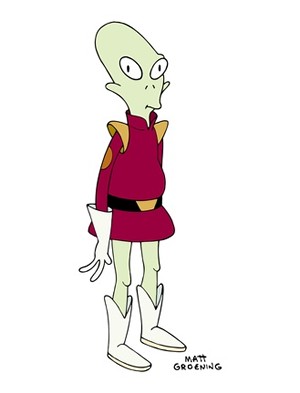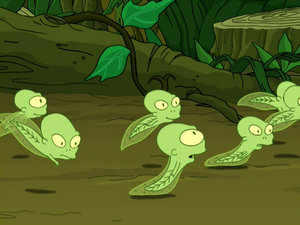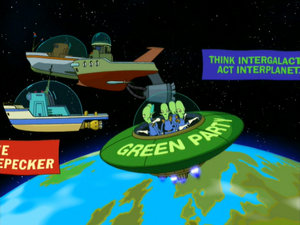Difference between revisions of "Amphibiosans"
Humorbot 0.4 (talk | contribs) (changing links to humans) |
Humorbot 0.4 (talk | contribs) |
||
| Line 4: | Line 4: | ||
==General== | ==General== | ||
''' | '''Amphibiosans''' are humanoid creatures that are smaller and lankier than the average [[Humans|human]], they resemble amphibians on Earth with whom they share some basic traits. They have no hair and possess only three fingers on each hand and two toes on each foot. Their skin colour is a light green, and their slanted eyes are greenish-yellow with slit-like pupils. Amphibiosans have no noses to speak of, but possess two nostrils, and the ears are set quite low on the head and stick out a bit. The mouths are like lipless beaks. Their blood is green, and they have no bones and are instead supported by a system of liquid-filled bladders. The only known difference between males and females is that the females have eyelashes, both genders are capable of giving birth. Their social structure is clan-based, and their home planet is an important member of the [[Democratic Order of Planets (DOOP)]]. | ||
===Life Cycle=== | ===Life Cycle=== | ||
Amphibiosans bear their young inside their bellies like mammals until they are ready for birth. The post-birth life of an Amphibian begins in the swamp of their clan's birthing grounds. The parent gives birth on the shore to several dozen or hundreds of tadpole-like offspring which make their way towards the water, a dangerous phase in which their lives are threatened by predators. The role of the [[smizmar]] in this part of the process is to protect them on their short journey. The next twenty years are spent in the water, until they mature into children, sprout legs and crawl ashore. From there, the life cycle seems to be similar to that of [[Humans|humans]]. | |||
===Reproduction=== | ===Reproduction=== | ||
[[Image:Kif's Children.jpg|left|thumb| | [[Image:Kif's Children.jpg|left|thumb|Amphibiosan babies after birth (wih Leela's DNA).]] | ||
When an | When an Amphibiosan of any gender experiences deep feelings of love, he or she enters a so-called receptive state. The skin becomes a semi-permeable membrane that allows the passage of genetic material. This material is used to conceive the offspring. The Amphibiosan in the receptive state is prone to accidental impregnation if genetic material from another person touches the skin. The DNA can be from a different species (like humans), thus enabling cross-species breeding. However, the mother/father is considered to be the person that inspired the feeling of love, not the genetic parent. This person is called the [[smizmar]]. The existance of two genders suggests that there is also a sexual method of reproduction. The young grow inside the parent's body until they are ready for birth. | ||
===Racial Abilities=== | ===Racial Abilities=== | ||
Amphibiosan's bodies can be stretched very far, and they can bloat parts of themselves by pumping air inside them. They have no bones and are supported by a system of fluid-filled bladders, which is probably responsible for their stretching ability. They possess a camouflage reflex that may be triggered involuntarily by shock or surprise, blending the Amphibiosan into the background - they become seemingly transparent, except for their eyes. Amphibiosan are also capable of attaching themselves to walls and ceilings with their hands and feet, like a gecko. If necessary, they are able to shed their skins, although for some unknown reason they seem to wear underwear under their skin... | |||
[[Image:Amphibian Spacecraft.jpg|right|thumb|Amphibian Spacecraft]] | [[Image:Amphibian Spacecraft.jpg|right|thumb|Amphibian Spacecraft]] | ||
Revision as of 17:49, 25 March 2007
Home Planet: Amphibios 9
General
Amphibiosans are humanoid creatures that are smaller and lankier than the average human, they resemble amphibians on Earth with whom they share some basic traits. They have no hair and possess only three fingers on each hand and two toes on each foot. Their skin colour is a light green, and their slanted eyes are greenish-yellow with slit-like pupils. Amphibiosans have no noses to speak of, but possess two nostrils, and the ears are set quite low on the head and stick out a bit. The mouths are like lipless beaks. Their blood is green, and they have no bones and are instead supported by a system of liquid-filled bladders. The only known difference between males and females is that the females have eyelashes, both genders are capable of giving birth. Their social structure is clan-based, and their home planet is an important member of the Democratic Order of Planets (DOOP).
Life Cycle
Amphibiosans bear their young inside their bellies like mammals until they are ready for birth. The post-birth life of an Amphibian begins in the swamp of their clan's birthing grounds. The parent gives birth on the shore to several dozen or hundreds of tadpole-like offspring which make their way towards the water, a dangerous phase in which their lives are threatened by predators. The role of the smizmar in this part of the process is to protect them on their short journey. The next twenty years are spent in the water, until they mature into children, sprout legs and crawl ashore. From there, the life cycle seems to be similar to that of humans.
Reproduction
When an Amphibiosan of any gender experiences deep feelings of love, he or she enters a so-called receptive state. The skin becomes a semi-permeable membrane that allows the passage of genetic material. This material is used to conceive the offspring. The Amphibiosan in the receptive state is prone to accidental impregnation if genetic material from another person touches the skin. The DNA can be from a different species (like humans), thus enabling cross-species breeding. However, the mother/father is considered to be the person that inspired the feeling of love, not the genetic parent. This person is called the smizmar. The existance of two genders suggests that there is also a sexual method of reproduction. The young grow inside the parent's body until they are ready for birth.
Racial Abilities
Amphibiosan's bodies can be stretched very far, and they can bloat parts of themselves by pumping air inside them. They have no bones and are supported by a system of fluid-filled bladders, which is probably responsible for their stretching ability. They possess a camouflage reflex that may be triggered involuntarily by shock or surprise, blending the Amphibiosan into the background - they become seemingly transparent, except for their eyes. Amphibiosan are also capable of attaching themselves to walls and ceilings with their hands and feet, like a gecko. If necessary, they are able to shed their skins, although for some unknown reason they seem to wear underwear under their skin...
Characters
Appearances
- Love's Labours Lost in Space (1ACV04)
- A Flight to Remember (1ACV10)
- When Aliens Attack (1ACV12)
- Brannigan, Begin Again (2ACV02)
- A Head in the Polls (2ACV03)
- The Problem with Popplers (2ACV15)
- Anthology of Interest I (2ACV16)
- War is the H-Word (2ACV17)
- Amazon Women in the Mood (3ACV01)
- The Birdbot of Ice-Catraz (3ACV05]
- Kif Gets Knocked Up a Notch (4ACV01)
- A Taste of Freedom (4ACV05)
- Where No Fan has Gone Before (4ACV11)
- Three Hundred Big Boys (4ACV16)


